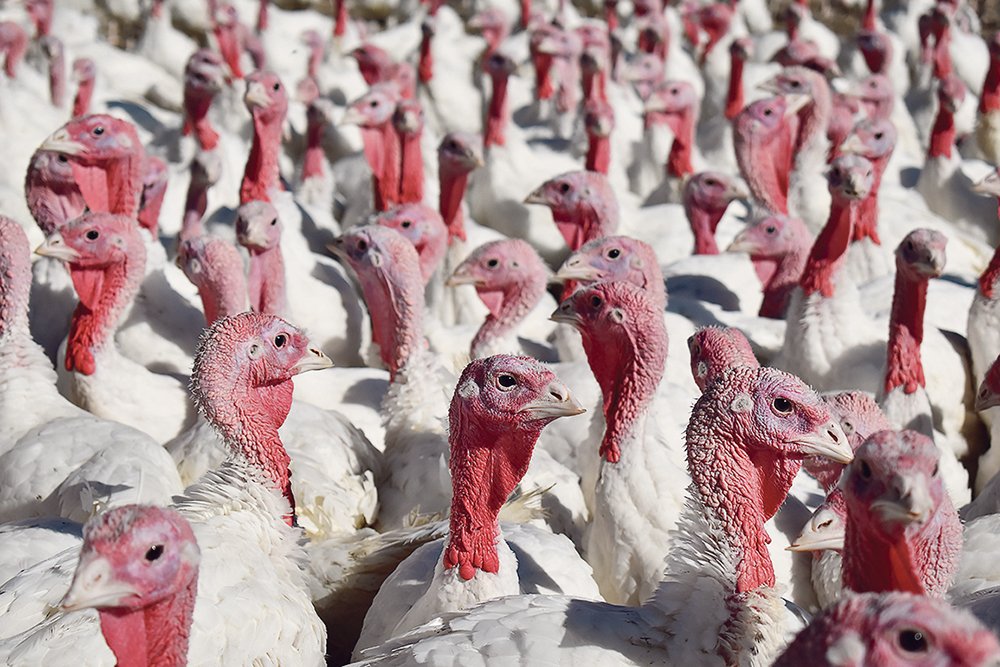Enough turkey for Christmas, say growers

Despite news reports about potential shortages during Christmas, the turkey industry has its fingers crossed that supply will meet demand.
Although production fell significantly due to the impact of the COVID-19 pandemic on the market, “we think the turkeys will be there on time,” said Cara Prout, executive director of Alberta Turkey Producers. “I’m not really sure that there will be a concern buying turkeys for Christmas.”
However, there is an outside chance of a shortage depending on how strong demand is this year, said Michel Benoit, general manager of the B.C. Turkey Marketing Board.
“We just don’t know what people are going to do at Christmas. We certainly have the lowest inventories we’ve ever had, so that’s the truth.”
Supplies will be sufficient if demand is similar to what it was last year, he said. One wild card is the effect of the new Omicron variant of COVID-19 on sales of whole turkeys, he added.
The recent spread of the variant has boosted fears about the safety of travel and gatherings of people within Canada during the holidays at a time when concerns had eased due to higher vaccination rates. That might dampen sales of whole birds.
“What will Omicron do to family gatherings between now and (Christmas), there’s just the crystal ball,” said Benoit on Dec. 2. “And so I think you’re as likely as I am to be able to determine what the demand at Christmas time will be by the time we get through these next three weeks.”
Prout said another wild card is how consumers will react to reports of potential turkey shortages, pointing to what happened to supplies of toilet paper early in the pandemic.
“I can only speak from my observation of what I’m seeing in the media … and so when people hear that message, it could trigger people wanting to go to the grocery store and stock up on whole birds, or buy their whole birds early.”
However, the market should be “fairly balanced” for the holidays, said Darren Ference, chair of the Turkey Farmers of Canada. “We’ve put more supply back into the marketplace and in barns in July, so some of that should be coming on just prior to the Christmas market… and the whole bird turkey should be good for the Christmas season.”
The flooding in southwestern B.C. that has hit farmers across many sectors likely won’t have a significant impact on turkey supplies in the province, said B.C. Agriculture Minister Lana Popham during a news conference Dec. 3.
“We might have been hearing about turkey shortages … but I can assure you that only two percent of the annual provincial production has been lost, and I think this bodes well as we head towards some holiday meals together.”
Benoit said Dec. 2 it was taking “an incredible amount of time” for trucks to get to B.C.’s interior due to road links severed by flooding and landslides. However, he was optimistic the situation will be resolved before Christmas.
As part of a supply-managed industry, turkey farmers must strike a balance between production and predicted disappearance or demand based on the previous year, said Prout. Although home consumption increased due to the pandemic, overall demand declined in 2020 due to restrictions affecting the food service and retail sectors.
Benoit said a “big part was the offices closing and no one going to Tim Hortons and Subway, and hotels not having banquets where they might have a turkey carving station, or where they’re serving turkey sausages for breakfast or turkey sandwiches for lunch, so the whole food service sector really, really struggled during those two years.”
Prout said the turkey industry began to lift production as demand began to improve this year, “so basically, it just takes time for that to happen.” Bunkers usually don’t become full until about two weeks before Christmas, she added.
Further complicating the situation is a trend in recent years of Canadians buying fewer whole turkeys, she said. “The turkey market was actually shrinking. We were having to adjust downward because there wasn’t as much consumption during festive seasons as there has been historically.”
There has been a shift by consumers to more of a cut-up product such as turkey roasts and ground turkey, something Prout attributed to decreasing family sizes among younger people and the need for meals that take less time to prepare.
“You know, we’re all busy, we have kids, we’re working, maybe you don’t really have the big sit-down family dinners that used to happen where it made sense to cook a whole turkey.”
Meanwhile, turkey producers have been faced with feed costs that have soared 25 to 30 percent, said Ference, who has a farm near Edmonton. “And also feed prices drive up our cost of our poults (young turkeys) that we purchase, so it affects you all the way through, and that’s been reflected in the price increases that you’ve seen.”
Source: www.producer.com

